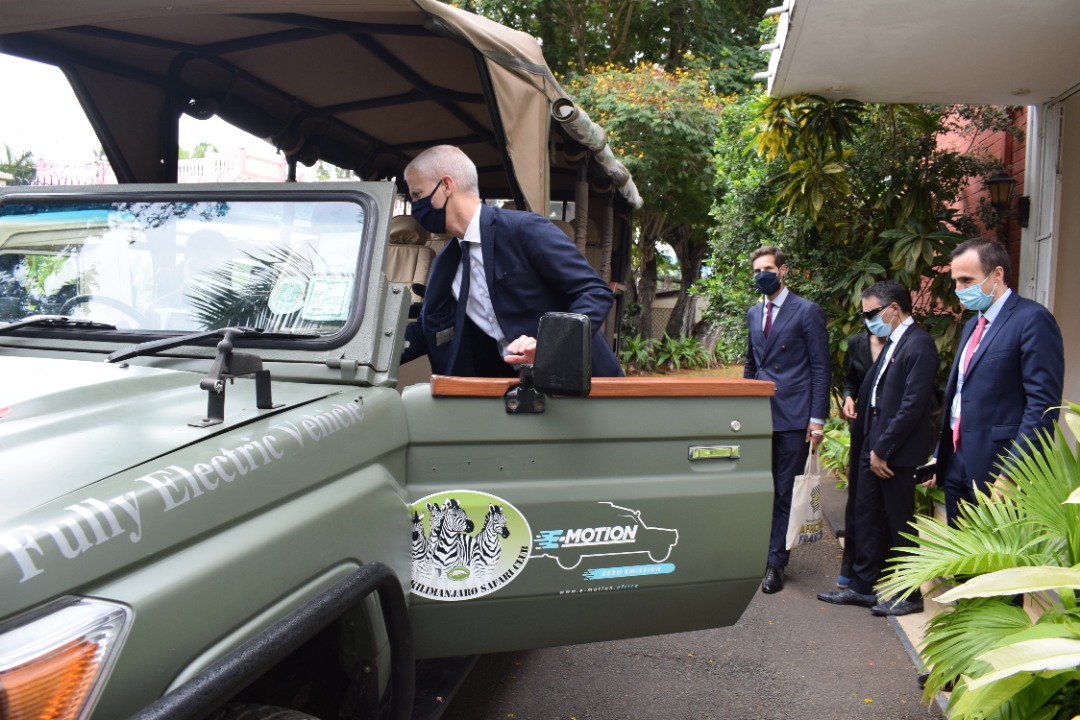Written by
Faridah N Kulumba
Africa-Press – Tanzania. France Minister for Foreign Trade and Economic Attractiveness Franck Riester on 20 October 2021, officially launched the environmentally-friendly electric cars by E-Motion Africa.
Minister Riester, emphasised that France is committed to promote partnership and sharing technology with Tanzania. The E-Motion Africa is the result of a partnership between four companies in their field (Hanspaul Group, a manufacturer of safari cars Gadgetronix, a builder of solar farms, Akuo and Carwatt).
The Citizen reported that the project was initiated by the French safari company Mount Kilimanjaro Safari Club (MKSC) which has been operating for twenty years in the north of the country in the national park.
Tanzania-France relations
France and Tanzania share many values, thus enabling a mutual understanding and a trustful relationship since the independence of Tanganyika in December 1961. The trust the two nations have built throughout the years allows France and Tanzania to enjoy a strong cooperation on various and important subjects, economic, political, cultural and soci-etal. The most recent example is the two nations working together for the success of the Generation Equality Forum, held in Paris between 30th June to 2nd July 2021, with the exceptional visit of Vice-President, H.E Dr Philip Mpangom embodying Tanzania’s commitment to gender equality.
The bilateral trade ties between the two countries are increasing. In 2020, the total amount of trade between France and Tanzania rep-resented 150 million dollars, more than 90 percent of French exports are based on 4 major sectors, mechanical equipment, electronic and Information Technology equipment; while imports from Tanzania are mainly from the agro-food sector, forestry, and fishing industry.
Vehicle for the future Phase 2
The E-Motion Africa was created in 2019 with the aim of providing an original and simple solution to the challenge of carbonising transport in Tanzania and proposes to convert the diesel engine of safari vehicles into an electric motor, powered by energy photovoltaic.
Vehicle for the future Phase 1
The company launched its first two electric cars in 2018 taking advantage of used Toyota car recycling (deployed in Serengeti National Park and Mkomazi National Park, the Rhino Sanctuary) and since then the company has 9 electric cars at three different locations and a garage in Arusha.
Objectives
The project is to give a second life to vehicles and to use Renault recharging batteries (those which are no longer suitable for European cars) a second life, and to equip all safari vehicles. This in turn, would allow a silent movement, more respectful of the fauna in the parks, which is doubly respectful of the environment.
The E-Motion Africa has partnered with Arusha Technical College (ATC) by including it in its board of trustees and offering graduate students the opportunity to join the company.
From the economic, social and environmental point of view, the managing director MKSC George Ole Meing’arrai, said the benefits of the project will be significant and could also be extended to other forms of mobility such as buses, taxis, safari cars and private vehicles.
Gains
With E-Motion Africa, Tanzania’s tourist attractiveness will be considerably enhanced as it will be the first country in Africa to use electric cars on all of its safaris.
User-friendly
Mr Ole Meing’arrai revealed that currently one could charge the e-car battery using home electricity in between three and 12 hours depending on the type. And the fully charged battery could cover a distance of between 180-150km.
Cutting costs
Vehicle maintenance costs will be greatly reduced by converting vehicles to electric. The experience observed on retrofit safari vehicles in the private sector suggests savings of nearly $5,000 per year per vehicle (more oil, filter, brake pads battery charge, etc.)







